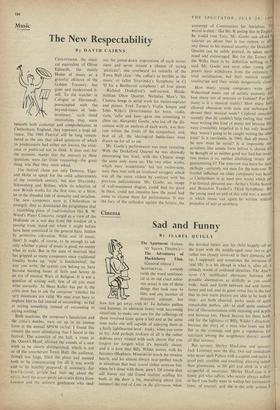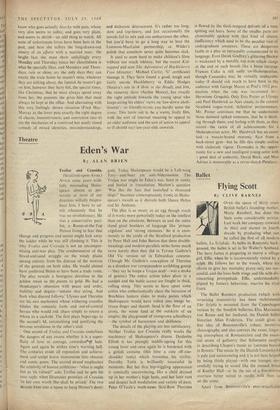Cinema
Sad and Funny
By ISABEL QUIGLY
The Apartment. (Leices- ter Square Theatre.)— The Adventures of
Huckleberry Finn. (General release.)
SENTIMENTAL comedy (with the word sentimen- tal in its old exact amor- ous sense) is one of those things that look easy to film, and any number of directors attempt; but how few get away with it! To balance pathos and humour, to alternate funny with harrowing situations, to make one care for the sufferings of those involved (care quite a lot) and at the same time make one still capable of enjoying them at a fairly lighthearted level: tricky, when you come to try. And perhaps trickiest of all is the rather dubious story treated with such charm that you forgive (or forget) what it's basically about; and it is here that Billy Wilder scores, with his heroines (Hepburn, Monroe) to touch the stoniest hearts, and his almost always near-perfoct touch in situations that may sound rather noxious but, when he's done with them, aren't. Of course that still leaves our old friend realism sculling his heels at the door a bit, moralising about (for instance) the end of Love in the afternoon, when the devoted father sees his child happily off on the train with the middle-aged roue (we've got rather too closely involved in their domestic set' up, I suppose); and sometimes the intrusion of 'real life' is a bit abrupt in what is, after all, a comedy world of confused identities. The Apail‘ nient ('A' certificate) alternates between the possible alternatives as skilfully as you could wish: back and forth between sad and funny, funny and sad, and its great virtue lies in the fact that its two main players arc able to be both at once: are both cheerful, perky souls of quite remarkable pathos, ablr< to stuff quite ordinary bits of characterisation with meaning and depth, and humour too. Thank heaven for them both, and for the lightness of Billy Wilder's direction; because the story of a man who lends out his flat in the evenings and gets a reputation for satyriasis among the neighbours doesn't sound all that savoury.
But savoury Shirley' Maclaine and savoury Jack Lemmon save the day, two sad comedians who never spell Pathos with a capital and make a good pair, credible and touching, pleasing rather than glamorous, as lift girl and clerk in a sky- scraperful of insurance Shirley Maclaine is a funny girl who suffers, who nearly always suffers so hard you badly want to wallop her tormentors (men, of course); and she is the only actress 1
know who goes actually blotchy with pain, whose very skin seems to suffer, and goes very plain, and seems to shrink—an odd thing to watch. All sorts of unfortunate loves have been hers in the past, and here she suffers the long-drawn-out misery of an aflaire with a married man: the bright face she must show unfailingly every Monday and Thursday (since her cheerfulness is what he specially likes, and Mondays and Thurs- days, rain or shine, arc the only days they can meet); the train home he mustn't miss, whatever they arc talking about, the lipstick he mustn't get on him, however they have felt, the special times, like Christmas, that he must always spend away from her, the presents she gives him that must always be kept at the office. And alternating with this very feelingly shown situation (Fred Mac- Murray as the lover puts exactly the right degree of charm, insensitiveness, and conviction into it) are the mechanics of a contrived but neatly timed comedy of mixed identities, misunderstandings, and elaborate ddnouement. It's rather too long, slow and top-heavy, and just occasionally the moods. fail to mix and one embarrasses the other, but you'd have to go a long way to beat the Lemmon-MacLaine partnership, or Wilder's polish that somehow never quite becomes slick.
It used to seem hard to make children's films without too much whimsy, but the recent Kid- napped and now The Adventures'of Huckleberry
Finn (director: Michael Curtiz; certificate) manage it. They have found a good, tough and fairly uncute Huckleberry in Eddie Hodges (Sinatra's son in A Hole in the Head), and Jim, the runaway slave (Archie Moore), has exactly the right attitude towards the young sprat who keeps airing his elders' views on 'low-down aboli- tionists': so friendly-ironic you hardly sense the irony. This turns out to be a 'warm, lively film, with the sort of internal meaning to appeal to an older audience and the sort of action to appeal to (I should say) ten-year-olds onwards.



































 Previous page
Previous page